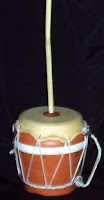
Christmas in Spain begins on December 22nd with the school holidays and the traditional Christmas-lottery draw, glorified with art work depicting the holy birth. Lights and Christmas decorations adorn all main and commercial streets across the country.
One of the main traditions is the Nativity scene, a miniature representation of the Holy Family depicting the birth of Christ, together with shepherds, the 3 Wise Men, and angels, is normally placed under the Christmas tree in the majority of homes. These can truly be a true work of art.
One beloved Christmas tradition is a gathering of little ones around the Nativity scene while they sing "villancicos" or carols (Christmas songs) accompanied by lively tambourines and zambombas.
Zambomba
December 24th:
La Cena de Nochebuena y la Misa del Gallo
The night of December 24th is Christmas Eve and families have dinner in the home dining room shared by a beautifully decorated Christmas tree and nativity scene.
 The tradition of Nochebuena "Christmas Eve" is widely celebrated. In fact, until just recently, bars and restaurants remained closed on that holy night.
The tradition of Nochebuena "Christmas Eve" is widely celebrated. In fact, until just recently, bars and restaurants remained closed on that holy night. A familiar meal, consisting of several dishes, is served at this time and the menu is varied. The most common meal is seafood or poultry, such as turkey, and until recently, each region had their own typical dinner.

The Christmas Eve dinner usually begins with a variety of seafood or meats, which can also be lamb, goat, or pork and is served with Catalan Cava, the Spanish name of "Champagne". Typical Christmas sweets such as "polvorones" or "Turrón" (a nougat mixture of almonds, honey & egg) along with mixed nuts, figs, raisins, and marzipan are also served.
Christmas Sweets


Marzipan & Polvorones
Turrones
Christmas joy is overflowing in conversations at the family dinner table and throughout the streets. After dinner everyone play cards or other family games such as Monopoly, or Lottery, etc.
Families walk through the streets while kid's choirs sing carols from house to house and ask for "aguinaldo" (sweets, coins, etc. similar to Halloween trick-or-treating, without the costumes). This tradition has almost been lost in the big cities, but it is still preserved in all the villages.
On Christmas Eve we celebrate the "Midnight Mass" at church. At twelve o'clock practicing Catholics attend "La Misa del Gallo" or Rooster´s Mass. According to tradition, this animal was the first to witnews the bmrth of Jesus and announce it to the world.
It is common for family members to attend church together for this special Midnight Christ-Mass.Young people go to celebrate Christmas parties with their friends, after family dinner gatherings and mass.
December 25th: The Christmas Day Meal
 The Christmas Day meal is the biggest feast of the year, and the family gathers in the broadest sense. This special-holiday family reunion includes grandparents, uncles, aunts, cousins, etc. Everyone is dressed in their best outfits and bring their very special culinary dishes. The traditional Christmas menu of poultry, seafood, and lamb are required.
The Christmas Day meal is the biggest feast of the year, and the family gathers in the broadest sense. This special-holiday family reunion includes grandparents, uncles, aunts, cousins, etc. Everyone is dressed in their best outfits and bring their very special culinary dishes. The traditional Christmas menu of poultry, seafood, and lamb are required.On Christmas Day little ones receive gifts from "Papa Noel" (Santa Claus). The Anglo-Saxon tradition of Santa Claus is slowly substituting our traditional Three Wise Men from the East, as well as sacred Nativity scenes.
The 28th of December is the day of the innocent (April´s Fools' day) when it is also allowed for everyone to play tricks on each other. Christmas is such a fun-filled time for the children.
New Year's Eve: Grapes & Bells
Almost all families spend New Years Eve watching television together as the final strokes of midnight occur at 12:00 o'clock on Madrid's Puerta del Sol clock. This custom comes with the twelve grapes of luck, eaten together as a family, with each 12 strokes of midnight.
From that moment on it is a festive celebration, while everyone dips their churros in chocolate sauce.
January 1st: New Year's Day
Some families gather in celebration of the new year with a special family meal.
January the 6th: The 3 Kings or Three Wise Men
This day is dedicated to children. On January 5th we witness the arrival of the Three Wise Men from the Far East. They come in and parade through the streets of our towns and cities throwing candy for the children.
All the children must go to bed early that night because they cannot be awake when the Kings come. If they have been good and have done well at school, the Kings will bring them everything they have asked for. However, if the children have not behaved, or done well at school, then they will only get coal, similar to old-fashioned Christmas-stocking rules.
All the children must go to bed early that night because they cannot be awake when the Kings come. If they have been good and have done well at school, the Kings will bring them everything they have asked for. However, if the children have not behaved, or done well at school, then they will only get coal, similar to old-fashioned Christmas-stocking rules.
This post is especially dedicated to @trisha22522 and @Luchadora41







